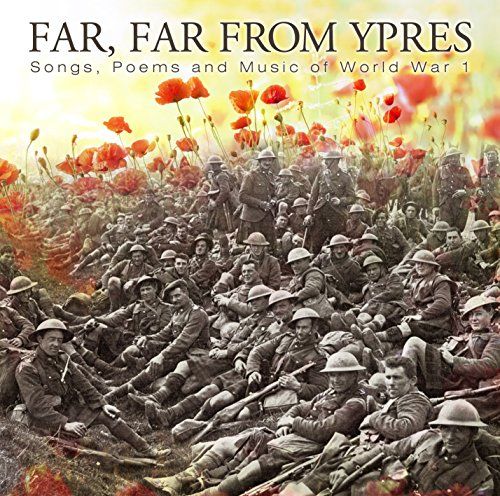My own country, the United States, didn't enter the First World War until 1917. Our late entrance and the fact that the conflict did not reach our shores mean that those men who gave their lives in that war are often overlooked on Memorial Day, the national holiday on which we remember all those Americans who died while serving in the military. This is sadly ironic considering the holiday was originally intended to honor the Union soldiers of our Civil War but was widened to include all casualties after World War I.
In Europe, however, the First World War is much more keenly recollected with memorials and graveyards in abundance. For instance, it is nearly impossible to find a town in the UK that doesn't at least have a cenotaph commemorating its soldiers who died in the war. Scotland did its part on behalf of the British Empire in 1914-18. Indeed, more Scots served than from any other part of the Empire. Consequently Ian Green of the Scottish label Greentrax has assembled Far, Far From Ypres, a 2CD collection of songs and poems of those grim years.
The first CD features newly-recorded versions of songs sung by the soldiers in the trenches, a couple of bagpipe pieces, and a handful of the popular music hall songs of the era. Contributors include Scottish folk luminary Ian McCalman, Maartin Allcock, formerly of Fairport Convention and Jethro Tull, Hamish Bayne, and a host of others. The bulk of the disc is given over to the short bits of song that the Tommies sang to pass the time as they waited for the bullets to fly again. McCalman leads The Scottish Pals as they bring to life nearly 30 tunes. Instrumentation is minimal with acoustic guitar, a fleeting accordion, and percussion to be had, but the emphasis is on the vocals. The songs are simple yet convey very vividly the struggles of the young men who fought in the war.
Listeners will be familiar with "It's a Long Way to Tipperary" already, but the likes of "I Wore a Tunic" are going to be new to most. Many of the songs here have sprightly melodies and dark humor which belie the horrors described in the lyrics. There's something unsettling about the cheerful music of "Gassed Last Night" set against lyrics such as "Because phosgene & mustard gas is too much for me". More than one song takes a shot at the commanding officers who were safely tucked away from the fighting. "Forward Joe Soap's Army" utilizes "Onward Christian Soldiers" for its melody but the soldiers march to war "with our old commander safely in the rear". The officers of "The Old Battalion" are drinking rum out of harm's way while the grunts are to be found "hanging on the old barbed wire".
The hit parade of the time is represented by a full version of "It's a Long Way to Tipperary", Ivor Novello's "Keep the Home Fires Burning", and a few others. The disc closes with a lone piper playing the funereal "The Flowers of the Forest" and the bugle call, "The Last Post".
More pipes and drums open CD 2 before Iain Anderson of BBC Radio Scotland reads John McCrae's famous poem "In Flanders Fields", one of the highlights of the album. From here things take an odd turn. Although there are more poems, much of the disc is devoted to contemporary songs about the war and war in general by the likes of The Corries, Dick Gaughan, and Eric Bogle. Amongst the inclusions is Bogle's classic "And the Band Played Waltzing Matilda". On the other hand, Steve Palmer's brooding "Black Is the Sun" languishes in its dullness. With the first CD being only 45 minutes, one is forced to wonder why the poems written contemporaneously with the war were relegated to a separate disc to sit uneasily with songs, many of which were written during my lifetime.
Had Far, Far From Ypres been a single CD, it would have been hailed as a striking and tuneful portrait of an era long gone. As it is, the album is a Janus-like affair which eschews cohesion in favor of struggling towards something more comprehensive.
(This was originally published at The Green Man Review back in 2003-08.)

No comments:
Post a Comment